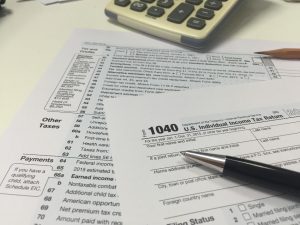Do you know all about taxes? Unless you’re a tax professional, the answer is probably no. Taking the time to learn about the basics will help you keep more of your hard-earned money. Here are 7 simple preparation and filing tips to help you get started.
 Does the idea of tax season fill you with dread? Are you among the millions of Americans who procrastinate filing because you don’t know where to begin?
Does the idea of tax season fill you with dread? Are you among the millions of Americans who procrastinate filing because you don’t know where to begin?
If you’re putting off filing your taxes because you’re confused about the process, it’s time to make a change.
You don’t need to know all about taxes, but it’s important to have the basics covered.
Listed below are seven simple tax tips that everyone needs to know.
Table of Contents
1. Max Out Your Retirement Contributions
Did you know that you can deduct the money you invest in a 401(k) or IRA from your taxes? Basically, any money you put into these accounts is shielded from taxes. This is a great first step to invest in your future.
Make sure you’re putting as much money away for retirement as possible. Not only will this set you up for success later on in life, but you’ll also have to pay less when tax season rolls around.
Keep in mind that there the IRS imposes limits on the amount of money you can put away each year. Currently, if you’re under the age of 50, you can contribute up to $5,500 annually to an IRA. For a 401(k), you can contribute up to $18,500.
If you’re over the age of 50, you can contribute $6,500 to your IRA and $24,500 to your 401(k).
2. Be Sure to Report All Your Income
These days, most people have some kind of side hustle in addition to their regular 9-5 job. If you’re one of the millions of people working more than one job, be sure to report that income when it comes time to file your taxes.
This is especially important if your side job is some kind of contract work that doesn’t withhold any taxes. Since the taxes aren’t withheld, you are responsible for paying them yourself.
The IRS requires you to pay taxes any time you earn more than $600 from any employer.
Many people make the mistake of not taking out money and setting it aside for their tax payments. This can get them into a lot of trouble when January rolls around and they start getting ready to file.
The easiest way to avoid this issue is to take out a percentage from each paycheck and then make quarterly payments. That way, everything is paid on time, and you don’t have to deal with a massive bill at the beginning of the year.
3. Keep a Paper Trail
If you’re hoping to make deductions when you file your taxes, it’s important to have a record of the purchases that you want to deduct. Don’t just try to work from memory or guess — this could land you in hot water if you get audited.
Keep a file for all your receipts. If you’re a freelancer, you should also keep track of things like utility bills and the number of miles you have to drive to and from customer sites. You can potentially deduct all of this from your taxes and save quite a bit of money.
4. Start Early
 The sooner you get started, the better. Don’t wait until April to finally start digging through your receipts and calculating how much you owe.
The sooner you get started, the better. Don’t wait until April to finally start digging through your receipts and calculating how much you owe.
Not only will this give you a major headache, but you’re also unlikely to get as much back as you would have if you’d started early.
Getting started early is also important if you’re planning on hiring a professional to help you file your taxes. Remember how millions of people procrastinate filing their taxes? Well, accountants tend to get pretty busy the closer they get to the tax deadline.
If you want to be able to sit down with someone to figure out your tax return, it’s best to get in as early as possible. You’ll have an easier time scheduling an appointment, and you’ll have their undivided attention.
5. File Even if You Can’t Pay Your Bill
If you do end up in a situation where you have a large tax bill, don’t let the fact that you can’t pay it all up front stop you from filing your return. You’ll face a bigger penalty if you fail to return at all.
Pay what you can and then set up a payment plan with the IRS. They have systems in place to help you pay your bill with minimal interest.
6. Make a Payment Along with Your Extension Request
It’s okay if you need to file an extension to get some extra time to get your return together. But, keep in mind that an extension to file is not an extension of time to pay your bill.
If you owe the IRS money, you need to pay at least a portion of it before Tax Day. Otherwise, you’ll set yourself up for an unpleasant penalty.
7. When in Doubt, Call in a Professional
 Finally, if you’re still feeling nervous about filing taxes or just want a second opinion, don’t hesitate to hire a professional. This can be especially beneficial if you are a freelancer who has multiple streams of income — taxes can get confusing, fast, for people like you. Professionals will have full insight into all areas of taxation, ranging from acceptable expenses to issues such as Tax Relief . So, they’ll be able to help you tackle any challenges you find along the way with filing your returns.
Finally, if you’re still feeling nervous about filing taxes or just want a second opinion, don’t hesitate to hire a professional. This can be especially beneficial if you are a freelancer who has multiple streams of income — taxes can get confusing, fast, for people like you. Professionals will have full insight into all areas of taxation, ranging from acceptable expenses to issues such as Tax Relief . So, they’ll be able to help you tackle any challenges you find along the way with filing your returns.
Hiring a professional will give you peace of mind. They can also help you understand what you can do better in the future to make filing easier and less stressful.
Keep in mind that hiring a tax accountant doesn’t necessarily guarantee you won’t get audited. But, it’s still good to have a professional on your side, and they will usually help you fix whatever mistakes were made for free.
You can read more here about the benefits of hiring a personal tax accountant to help you file your taxes correctly.
Want to Learn All About Taxes?
These simple tax tips will get you pretty far when it comes to staying on top of your finances. But, if you want to take things to the next level and learn all about taxes, be sure to visit the tax section of our website.
We’ve got tons of information on everything from itemized deductions to tips on how business owners can save money at the end of the year. Check it out today!